Key takeaways:
- Hormone therapy is a personalized approach that requires consultation with healthcare professionals to effectively address individual symptoms and needs.
- Monitoring progress and open communication about side effects are crucial for successfully navigating hormone therapy and ensuring adjustments are made as needed.
- Engaging in self-care and being part of a support network enhances the hormone therapy experience, promoting overall well-being alongside physical health improvements.

Understanding Hormone Therapy Basics
Hormone therapy is essentially a treatment that involves introducing hormones into the body to balance levels and alleviate symptoms caused by hormonal imbalances. I remember grappling with symptoms that felt utterly overwhelming, like mood swings and fatigue, which caused me to question if I was alone in feeling this way. Have you ever felt that something just wasn’t right, even if you couldn’t pinpoint exactly what it was? That’s often how many start their journey with hormone therapy.
The most common types of hormone therapy include estrogen therapy for women, especially during menopause, and testosterone therapy for men who experience low testosterone levels. When I first learned about these options, my emotions were all over the place. It was both a relief and daunting to think that something so simple could make a significant difference in my quality of life. How powerful is it that one treatment could potentially restore balance and energy?
Understanding hormone therapy also means recognizing that it isn’t just a one-size-fits-all solution. It often requires careful consideration and consultation with healthcare professionals to tailor the approach to individual needs. I found that discussing my symptoms openly and honestly with my doctor led to the most effective treatment plan. Have you considered how personalized your treatment might need to be? Embracing the journey of hormone therapy means being open to adjustments along the way, which can lead to truly transformative results.

Reasons for Choosing Hormone Therapy
Choosing hormone therapy often stems from a desire to regain control over one’s life. I’ve spoken to many individuals who felt trapped in a cycle of inexplicable fatigue or emotional turbulence, desperately seeking relief. These feelings can be debilitating and often lead to exploring options like hormone therapy.
Here are a few compelling reasons why people opt for hormone therapy:
- Management of Severe Symptoms: Many decide on hormone therapy to address chronic symptoms impacting daily life, such as hot flashes, irritability, and sleep disturbances.
- Restoration of Normalcy: The hope of feeling “like oneself” again is a big motivator; I remember the sheer joy of waking up feeling refreshed for the first time in ages.
- Improved Quality of Life: Hormone therapy can significantly enhance overall well-being, allowing individuals to re-engage with activities they once loved, like hiking or social gatherings.
- Long-Term Health Benefits: Beyond the immediate relief of symptoms, some pursue hormone therapy to mitigate risks of osteoporosis or cardiovascular issues as they age.
- Empowerment: For many, the decision to pursue hormone therapy symbolizes taking charge of one’s health and well-being, stepping away from feeling powerless to truly embracing life.
I encountered a turning point when I realized how much my hormonal fluctuations affected my day-to-day interactions. Feeling emotionally stable allowed me to reconnect with friends and family, something I’d been missing for quite some time. Embracing the idea of hormone therapy felt less like relinquishing control and more like reclaiming it.
My Initial Consultations and Assessments
When I first stepped into the clinic for my hormone therapy consultations, I was filled with a mix of anxiety and hope. The initial assessment felt like a deep dive into my physical and emotional world. I remember being surprised by how thorough the process was; my doctor took the time to understand not only my symptoms but also my lifestyle and feelings. It was a validation of my struggles, which I hadn’t fully appreciated until that moment.
During my consultations, the healthcare team conducted various assessments, including blood tests to evaluate hormone levels. This part was enlightening. I never realized how intricately hormones could affect everything from my energy levels to my mood. In sharing my experiences, I felt an unexpected sense of relief. It seemed that every lab result painted a clearer picture of my health, leading us toward a more personalized treatment plan tailored specifically for my needs.
One significant takeaway for me was the importance of asking questions. My doctor encouraged me to inquire about anything I didn’t understand, which made the entire process collaborative. I vividly remember asking if diet played a role in hormone health. The answer was a resounding yes. I was inspired to explore ways to incorporate healthier choices into my life, complementing my hormone therapy. Have you ever found that a simple question opened so many new pathways for understanding?
| Aspect | Details |
|---|---|
| Initial Emotions | Mix of anxiety and hope |
| Assessments Conducted | Thorough evaluations including blood tests |
| Personal Reflection | Feeling validated and understood |
| Collaboration with Doctor | Encouraged open inquiries and discussions |
| Inspirational Takeaway | Importance of diet in hormone health |
Types of Hormone Therapy Options
Hormone therapy isn’t a one-size-fits-all solution; there are several options available, and each can cater to unique needs. For example, I found that bioidentical hormone therapy, which uses hormones chemically identical to those the body produces, felt particularly aligned with my approach to health. It allowed me to minimize side effects while addressing my hormonal imbalances effectively.
Another popular option is conventional hormone replacement therapy (HRT), which often involves synthetic hormones. Initially, I was hesitant about this method, fearing potential long-term effects. Yet, my conversations with healthcare professionals shed light on how HRT can be beneficial when closely monitored, reassuring me that I could prioritize my health without compromising safety.
I’ve also learned about alternative therapies, such as herbal treatments and dietary adjustments, which some practitioners advocate as complementary to traditional methods. It made me wonder: have you explored these routes? Personally, I found that integrating certain dietary changes significantly supported my therapy journey, providing not just physical benefits but also a sense of empowerment in controlling my well-being.
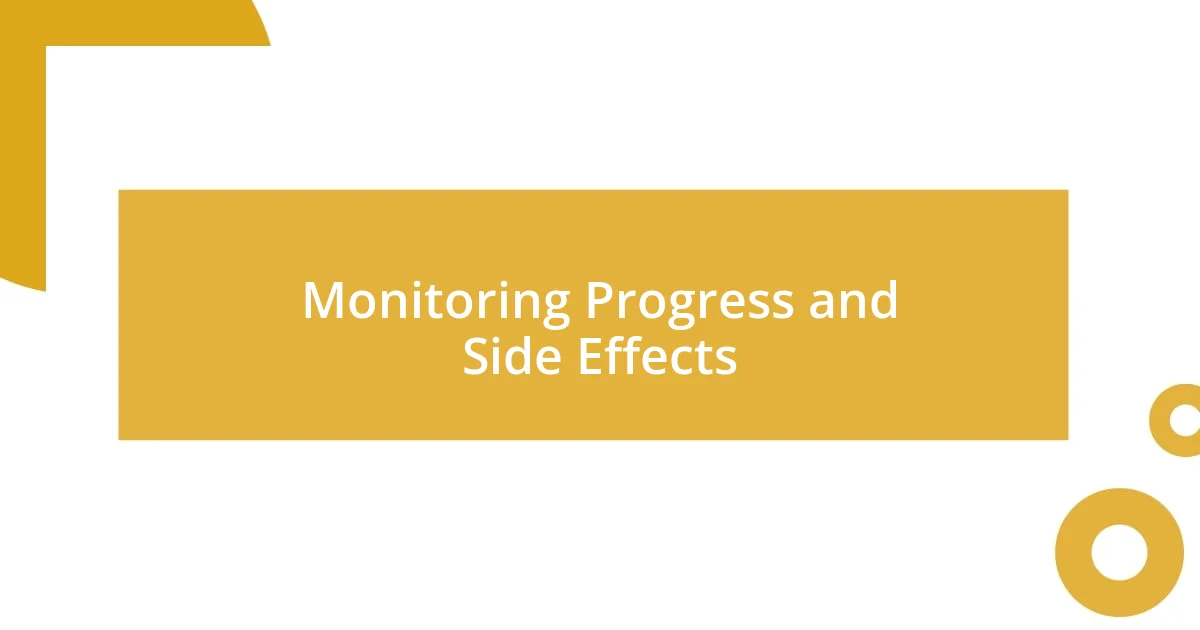
Monitoring Progress and Side Effects
Monitoring the progress of my hormone therapy became a pivotal part of the entire experience. I remember attending follow-up appointments feeling a mix of anticipation and curiosity. Each session, we reviewed my blood test results and discussed how I was feeling emotionally and physically. Tracking changes in my body and mood not only provided reassurance but also fostered a sense of connection with my healthcare team.
Side effects, however, became a topic that needed careful attention. Initially, I brushed off some symptoms, thinking they were just part of the adjustment phase. But as the weeks progressed, it became clear that open communication about side effects was essential. I learned to keep a journal, noting everything from mild headaches to emotional fluctuations, which turned out to be invaluable during my consultations. Have you ever felt unsure about whether something is a normal reaction? Documenting my experiences helped me feel more in control and proactive.
A pivotal moment came when I experienced unexpected fatigue. It really caught me off guard. I vividly remember sitting across from my doctor, sharing my concern, and feeling a weight lift as we addressed it together. With a simple dosage adjustment and a conversation about my stress levels, the fatigue started to fade. It taught me that monitoring isn’t just about numbers; it’s about listening to my body and advocating for myself every step of the way. Each appointment reminded me that flexibility and openness to adjustments are vital components of effective hormone therapy.
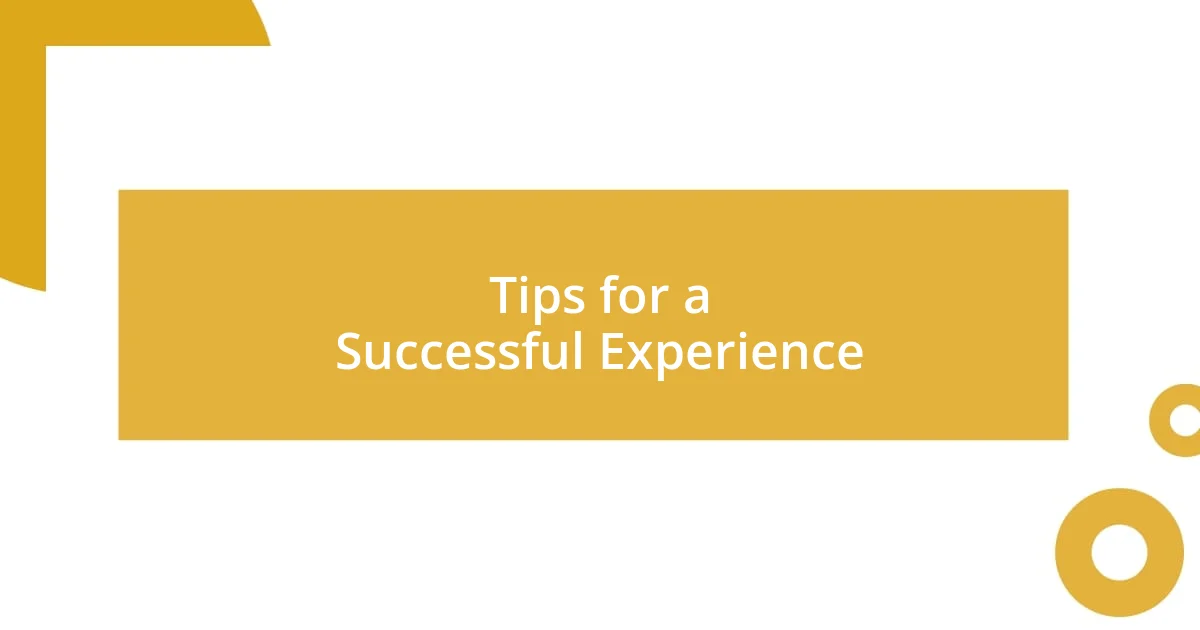
Tips for a Successful Experience
Staying organized and informed is crucial for a successful hormone therapy experience. I remember creating a dedicated binder where I kept all my test results, medication schedules, and notes from my appointments. Having everything in one place made it easier to track my progress and empowered me during consultations. Have you ever felt lost in a sea of information? I definitely have, and this system helped ground me.
Engaging in a support network can be incredibly beneficial. I joined an online community where I could share experiences and learn from others navigating similar journeys. Trust me, there’s something soothing about knowing you’re not alone in this process. I often found myself reflecting on how much their stories echoed my own challenges and triumphs. Have you sought support yet?
Lastly, don’t underestimate the importance of self-care during this journey. I set aside time for activities that brought me joy—be it yoga, journaling, or simply taking leisurely walks. Reconnecting with myself reminded me that hormone therapy is just one part of my health journey. It’s vital to nurture your mental and emotional well-being alongside physical changes. How do you prioritize self-care in your life? I found that when I took care of myself holistically, my therapy experience felt much more balanced and fulfilling.









